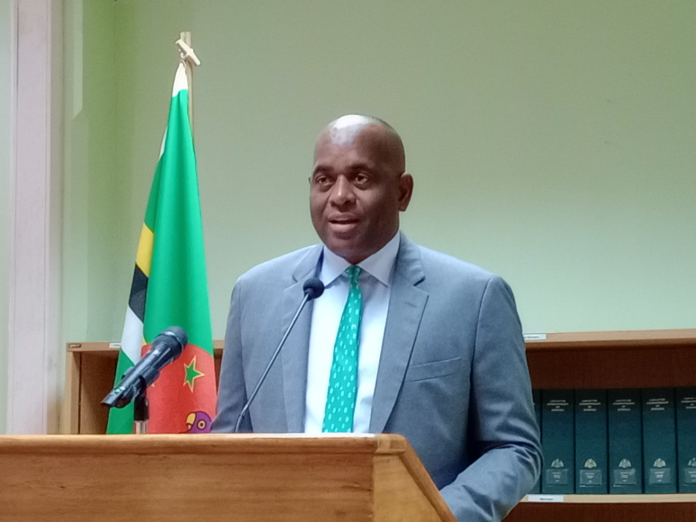
Dominica, Nov 22, CMC – Dominica Wednesday said it intends to sign the Samoa Agreement that will serve as an overarching legal framework for the relationship between the European Union (EU) and the Organisation of African, Caribbean and Pacific States (OACPS) for the next 20 years.
Prime Minister Roosevelt Skerrit told a news conference that while he is aware of the concerns being raised in several quarters, including the Roman Catholic Church, the agreement does not depart significantly from the Cotonou Agreement which it replaces.
Prime Minister Roosevelt Skerrit speaking during Wednesday’s news conference (CMC Photo)
“I don’t think the document itself highlights what is being pointed out in the public domain,” he said, noting that “people will have a different interpretation of the document like we have with the Bible and so it will all be left for interpretations.
“In terms of the language I do not necessarily believe that’s the case. We intend to sign…I believe overall it is a good document. It could be more refined, in an agreement it is not everything you want you get, but it is a framework document that does not necessarily impose any particular ills or views on us in the African, Caribbean, and Pacific regions.
“It is a framework document that is no different to other framework documents the world has signed on to,” Skerrit said, adding “In this world, you always have to be vigilant and I am happy that the Catholic Church is vigilant on that”.
Skerrit said he wanted to commend the Trinidad and Tobago Archbishop Jason Gordon and his St. Lucian counterpart Archbishop Gabriel Malzaire ”for the very clear setting up of the alarms and forewarning.
“I prefer to consider it to be a forewarning,” said Skerrit, a Roman Catholic, who said he intends to discuss the issue with Archbishop Malzaire.
The Samoa agreement was signed last Wednesday in Apai and succeeds the Cotonou Agreement. It covers subjects such as sustainable development and growth, human rights, and peace and security. Dominica was not present for the signing then
The provisional application of the agreement will start on 1 January 2024. It will enter into force upon consent by the European Parliament and ratification by all EU member states and at least two-thirds of the 79 OACPS members.
Archbishop Gordon in criticisng the new accord, said he was concerned that regional countries would have to sign an agreement that will “impose laws on their people that are not in keeping with the culture, values of us Caribbean people and it will be a colonial imposition one more time on small fragile states, on Africa, Pacific and us here in the Caribbean.
Gordon said that while the agreement is “written as a trade agreement and an agreement of support, financially, etc for the African Caribbean and Pacific nations, embedded in that agreement and when it is signed it is for 20 years and cannot be revoked …is anyone who signs that agreement will have abortion legislation in their countries.
“They will have to impose abortion legislation, transgender, LBGTQ, comprehensive sex education, a whole range of values will be imposed because of the signing of that document,” he added.
But Skerrit told reporters that while he has the “greatest admiration” for Archbishops Gordon and Malzaire, he would prefer to “respond to the general concerns that have been raised.
“The point is we don’t believe that the Samoa Agreement…. when you go to the Cotonou Agreement, articles clauses captured in the Samoa Agreement are similar in nature”.
Skerrit said that there are “really two areas where there is an interpretation of the language that would give one the impression that those things that have been pointed out are in fact in the agreement”.
He said they are not, adding that article 29 within the 403-page document that addresses the issue of health notes in part that “the parties shall support universal access to sexual reproductive health commodities and health care services, including for family planning, information and education and the integration of reproductive health into national strategies and programmes.
“This is what the document says. Article 48, gender equality and empowerment of girls and women, and …you go to section seven which says the parties shall commit to the full and effective implementation of the Beijing Declaration and Population and Development and the outcomes of the review conferences”.
He said it states “they shall further stress the need for universal access for quality and affordable comprehensive sexual and reproductive health information and education taking into consideration the UNESCO international technical guidance on sexuality education, as well as the delivery of reproductive health care services”.
The parties are also to pursue the effective implementation of the Montevideo consensus on population and development as appropriate.
Skerrit said “Some of the things that are being pointed out in the document are not in the document and I think people are looking at those sections and articles and indicating that there may be an opportunity for some of the things that we have concerns with may find themselves being implemented in our countries.
“I respect the counsel of the Church and I don’t think the council has been misplaced, I think what the Church may want to say to us is to caution us against going down that route, but it is not in the agreement.
“I give my dear readers of the Catholic Church the assurance this is not the case…and we know there are countries and organizations who have particular views on these things and they would like for us to implement these things but I don’t think the population of Dominica is ready for these things and if we are going into these areas it is likely we will have to do a referendum,” Skerrit told reporters,
“I don’t think those sections in the agreement really …is saying that’s what we are doing,” he added.
CMC/pr/ir/2023

